If you are looking for the cutting edge of sleep tracking technology, welcome to my round-up of devices that do a lot more than what passes for sleep tracking these days. These smart monitors are sooo much more accurate than the Fitbit and other simple motion-based trackers that you download for your phone.
These products are worth a look if you’re an athlete, performer, have a family with young children, 0r are simply obsessed with improving sleep wellness.
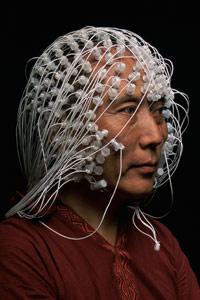
All five of the sleep trackers detailed below are passive in design–you don’t have to wear anything, or remember to charge your devices, or download your data night by night.
This way, you can set it and forget it, and then look at long stretches of your sleep habits when you are in the mood. That is awesome.
Also awesome is the fact that each of these devices uses a pioneering form of sleep tracking called ballistocartigraphy, which measures your heart rate, your respiration rate, as well as your physical movement.
Taken together, this technique is the best home sleep information you can currently get, rivaling even single node EEG measurement (which is not for everyone, as you have to wear a headband to get the data from your brain).
Note: this is a product round up; I did not personally test these devices. Also, I am not an affiliate, nor do I work for any of these companies.
Beddit
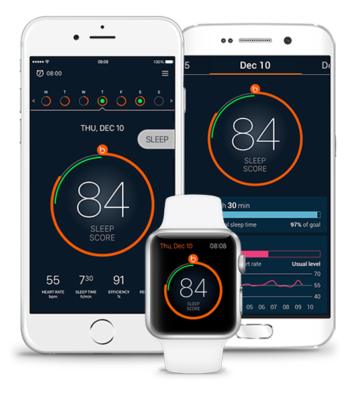 Beddit is hands down the most user-friendly professional grade home sleep tracker on the market. Beddit tracks your breathing, your heart rate, and your physical movements using a very sensitive method called ballistocartigraphy. Machine learning algorithms translate this data array into accurate sleep staging information.
Beddit is hands down the most user-friendly professional grade home sleep tracker on the market. Beddit tracks your breathing, your heart rate, and your physical movements using a very sensitive method called ballistocartigraphy. Machine learning algorithms translate this data array into accurate sleep staging information.
Seriously, the only thing more accurate is polysomnography that is analyzed by a sleep specialist. It’s also clinically verified, and working with universities to grow its data set.
The best part is that there’s no hardware to fiddle with after you initially set it up. The thin sensor slips under your mattress and then passively records sleep data for months. This makes intuitive sense and is a welcome contrast to most other sleep trackers that rely on you to remember to put on head gear every night, or recharge batteries, or keep your phone nearby, etc.
The smartphone app for Beddit turns the analysis of your sleep into actionable information. Armed with info about your total sleep, the time it takes to get to sleep, the length of your sleep stages, as well as snoring and respiration data, you can quickly track good nights versus bad nights via Beddit’s intuitive sleep scoring system.
Beddit also has a smart alarm, which will theoretically wake you up at an optimal time in your sleep cycle. I say “theoretically” because to my knowledge smart alarms have never been actually put to a peer-reviewed clinical test. You’re not very likely to have any deep sleep in the early morning anyways. Still, a smart alarm is likely to wake you up at a transition between REM and light sleep, which means it won’t wake you up in the middle of dream, which always sucks.
For athletes, Beddit is especially helpful, allowing for the tracking of resting heart rate and its relationship to athletic recovery. In their words, “You’ll also be able to observe how much of an impact your diet, exercise, and work behaviors have on your resting heart rate.”
You can also use Beddit even if you have a sleep partner — something that is not possible with other sleep movement trackers.
Personally, I love how Beddit is working with the sleep research community. Already there are more than half a dozen peer reviewed articles featuring Beddit’s technology.
A caveat: Although Beddit’s technology could actually detect micro-awakenings and other sleep irregularities to help with the diagnosis of sleep disorders, it’s not set up to be used as a medical device. If you think you have a sleep disorder, visiting a sleep lab is still the way to go.
Pricing: $149 in the US. Slightly more in the UK and Europe.
Emfit
 Emfit is quite similar to Beddit, as it is also a hands-off sleep tracker that slips under your mattress, but it has more features and a longer history of use in the sleep research field. Emit uses its own algorithms for heart rate, breathing, and movement to determine sleep staging and awakenings, with a helpful interpretation app to make it easy to track long-term sleep patterns.
Emfit is quite similar to Beddit, as it is also a hands-off sleep tracker that slips under your mattress, but it has more features and a longer history of use in the sleep research field. Emit uses its own algorithms for heart rate, breathing, and movement to determine sleep staging and awakenings, with a helpful interpretation app to make it easy to track long-term sleep patterns.
The standard Emfit QS device is geared towards athletes, with a focus on heart rate variability. Just as with Beddit, tracking athletic recovery is the goal here, as athletes can determine if they are over-training by tracking sleep health along with training regimes.
Emfit retails for $299, making it the most expensive at-home sleep monitor on the market, but if you are an athlete, this investment could take you to the next level in performance. You’re in good hands, as Emfit has close to a hundred independent peer-reviewed articles under its belt.
Emfit has several other products that serves some special populations. The Emfit MM is a sleep monitor for detecting muscle spasms in sleep, so parents can easily monitor children with epilepsy and other related conditions that include night-time seizures. This monitor is literally saving lives. Due to medical regulations, there are separate versions for the UK and outside the UK.
Emfit also has an application for seniors (in the UK only). SafeBed is a sleep monitor designed for caregivers of seniors with dementia. This sleep monitor is designed to alert caregivers to bed occupancy (night time wandering) as well as falls.
Juvo
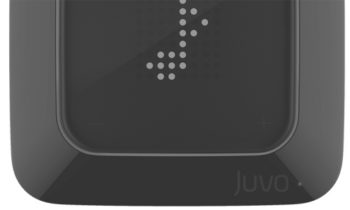 Juvo is the third offering for serious sleep tracking using ballistocartigraphy. Like Beddit and EmfitQS, the Juvo sensor slips under your mattress so you can forget about it and rack up some consistent sleep data. It also has a wifi-enabled bedside unit that serves as an alarm clock and a bedtime companion.
Juvo is the third offering for serious sleep tracking using ballistocartigraphy. Like Beddit and EmfitQS, the Juvo sensor slips under your mattress so you can forget about it and rack up some consistent sleep data. It also has a wifi-enabled bedside unit that serves as an alarm clock and a bedtime companion.
Like Beddit, Juvo offers a smart alarm, which will wake you up at an optimal moment in your sleep cycle, so you will (again, supposedly) wake up more easily and more refreshed.
Juvo also tracks light and sound pollution, as well as room temperature so you can find out common causes of sleep interruption. If your room is a little too hot or there’s some middle of the night sounds, your sleep can really be effected.
Juvo also offers a “sound conditioner” that helps you relax more quickly at bedtime by creating white noise to mask sudden erratic sounds, as well as providing some relaxing music.
Finally, Juvo shines in this category because it integrates with other home smart devices, such as the Nest thermostat and several brands of smart light bulbs (LIFX and Hue). That means you can wake up easily and naturally, with a warm house.
Juvo costs $199 – -that’s more than Beddit, but a lot less than the Emfit QS. Juvo seems geared not towards athletes but more generally towards working professionals who are looking to figure out what’s wrong with their sleep. A good choice if you have problems falling asleep (and staying asleep) and are already connected with other smart devices in your home.
Seven Hugs
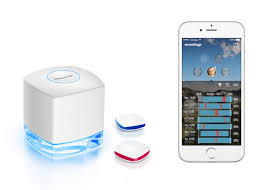 An alternative to the peak performance model for sleep tracking, Seven Hugs is a passive sleep tracking system for an entire household. Aimed at families with children, Seven Hugs has created an easy-to-use sleep tracking device that not only monitors sleep quality over time, but also socializes the experience and reinforces bedtime with its alarm features. By placing the central unit in your living room, at your children’s bedtime the device will glow, and the lights will dim. This is pretty innovative.
An alternative to the peak performance model for sleep tracking, Seven Hugs is a passive sleep tracking system for an entire household. Aimed at families with children, Seven Hugs has created an easy-to-use sleep tracking device that not only monitors sleep quality over time, but also socializes the experience and reinforces bedtime with its alarm features. By placing the central unit in your living room, at your children’s bedtime the device will glow, and the lights will dim. This is pretty innovative.
Like Juvo, Seven Hugs has some smart device integrations, so you can manage home temperature, humidity and light levels in synch with bedtimes and rise times. If you are a parent wondering what really happens with your kids when it’s lights out, Seven Hugs may be for you.
Note: I am not sure about the science behind Seven Hugs, or if they have done any clinical assessments of their technology. I reached out to them on this point several weeks ago but they did not respond with any new information. I’ll update when they do, as I suspect their tech is similar to what we have seen with the other hands-off sleep trackers.
For tracking two people, Seven Hugs costs $179. For a family of four, the cost is $249.
Nox Smart Sleep System
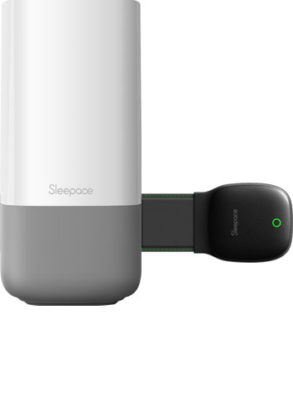 I saved the best for last. Not is a smart alarm clock that pairs with RestOn, a passive sleep tracker that slips under your mattress.
I saved the best for last. Not is a smart alarm clock that pairs with RestOn, a passive sleep tracker that slips under your mattress.
Together with a mobile app, this may be the most complete sleep tracking system known to human kind.
Nox’s premier environment tracking includes temperature, humidity, light and sound pollution. All of this is right out of the box, not just an ability to synch with other smart devices (i.e. no hidden costs).
Notably, the Nox alarm clock uses light therapy, switching to red-phase light near bedtime, a technique that helps with getting to sleep and staying asleep (unlike blue light from monitors and smart phones, which stalls melatonin production).
Nox also has sound therapy for relaxing while going to bed, a feature we’ve seen only with the Juvo.
All these features together make the Nox Sleep System possibly the best choice for convenience sake, especially if you are not obsessed with data, but just want feel better without a lot of hassle. Unlike most other sleep trackers, this device not only tracks your sleep, but automatically applies that knowledge towards your everyday routines using sound and light therapy, both while going to bed and waking up. That’s pretty attractive.
Its smart alarm makes the same promises as Beddit and Juvo, to wake you up in an optimal sleep stage for greater ease of awakening.
The Sleepace Nox smart light retails for $149, but if you want the RestOn sleep tracker too, the cost for the whole system is $279.
I’d love to hear your experience with any of these sleep trackers — or ones I may have missed. Leave a comment below!
By the way, this article is actually part three of my 2016 series on sleep tech. Part 1 covered notable sleep wearables and Part 2 covered smart alarm clocks.
First Image: CC Sleeping TV man, by Evan, 2010.
Interesting, will any of these accurately track REM sleep. I used ZEO and it was good for showing a WILD entry ie: going from wake to REM and the light sleep phases that are just before REM states.
Will any of these break the sleep into chunks like the ZEO used to do and will they record for naps, so give usable information for 30 or 40 minutes of sleep or relaxing >
allof these do sleep staging but Peter for your interests I think iWinks’s Aurora mask would be the way to go. Or possibly Neuroon